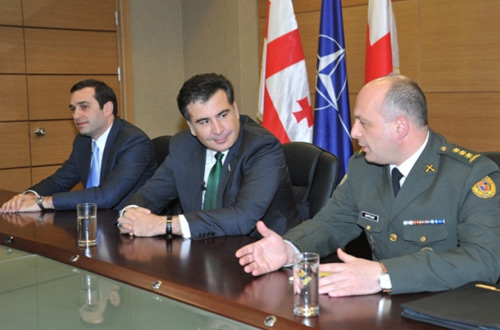| Saakashvili Presents New Chief of Army Staff |
| Civil Georgia, Tbilisi / 5 Dec.'12 / 19:31 |

From left to right: Defense Minister Irakli Alasania; President Mikheil Saakashvili and new Chief of the Joint Staff of the Armed Forces, Col. Irakli Dzneladze. Photo: MoD.
President Saakashvili was in the Ministry of Defense (MoD) on December 5 to present Colonel Irakli Dzneladze as new Chief of the Joint Staff of the Georgian Armed Forces.
Sitting next to Defense Minister Irakli Alasania, President Saakashvili said that he had “a constructive exchange of views” with the Defense Minister about selecting the new chief of army staff. He said that Col. Dzneladze was “a perfect candidate”.
Col. Dzneladze’s predecessor 32-year-old brigadier general Giorgi Kalandadze was suspended from office upon the court’s decision on November 11, about one month after President Saakashvili appointed him as army chief of staff shortly after the parliamentary elections. Brig. Gen. Kalandadze, who was released from police custody, faces criminal charges related to exceeding official powers into two separate cases and illegal confinement.
“You know that problems emerged in respect of previous chief of staff of the armed forces, whom I respect very much,” President Saakashvili said. “I think that this misunderstanding should be over soon and it will be over… and he will be back to service [in the armed forces].”
After Brig. Gen. Kalandadze was released on bail, he was received on November 10 by Mikheil Saakashvili in the presidential palace. At the time Brig. Gen. Kalandadze was still chief of the army staff. During the meeting President Saakashvili instructed Brig. Gen. Kalandadze to go back to the service in his capacity of the army chief of staff; however, next day the court suspended Kalandadze from the office upon the prosecutors’ request.
“In this situation we have no right to yield to emotions, because the armed forces are beyond the politics; the armed forces are above any personalities and above legal problems, even if created unfairly,” Saakashvili said on December 5. “We cannot stop development of the armed forces. We had a constructive exchange of views over this issue with the Defense Minister [Irakli Alasania]. The Ministry of Defense has the same views that we should continue moving towards NATO.”
“I think that if there have been some difficulties recently in respect of NATO, we should overcome them,” Saakashvili said, apparently referring to NATO Military Committee’s decision to postpone its visit to Georgia after former army chief of staff was arrested.
“I think that after the October 1 [parliamentary elections] we held all the aces for further progress [in respect of NATO integration],” he continued. “We should manage to continue this course through joint work. In 2014 there will be NATO expansion summit and I hope that by that time Georgia will be in good shape in order to join the next wave of NATO expansion.”
“The armed forces should be beyond the politics no matter of who is in the government,” Saakashvili added.
Defense Minister Irakli Alasania said during the same meeting that new chief of army, “selected as a result of consultations, is of course a positive step.”
“As it has been noted, the armed forces are beyond any politics,” Alasania said. “The political forces agree that the armed forces, like the law enforcement agencies, are completely beyond the politics.”
“The Georgian Armed Forces will never be a weapon for political games. Despite of differences [between the President and government] on number of issues, the Georgian army is something that the both political forces proudly appreciate,” Alasania said.
“I am sure that we will build upon the success of the October parliamentary elections and we will build strong, united state and take our place in the Euro-Atlantic family,” he added.
The U.S. embassy in Tbilisi said earlier on December 5 it was “encouraged” that at a time of “internal political tension” the government and the President “were able to reach agreement on a new Chief of the Joint Staff of the Georgian Armed Forces.”
NATO Secretary General, Anders Fogh Rasmussen, said after the NATO-Georgia Commission meeting in Brussels on December 5, that foreign ministers from the member states welcomed the agreement between the government and the President on appointment of the chief of army staff.
“It is a clear indication that parties involved try to move forward to ensure smooth cohabitation,” Rasmussen said.
